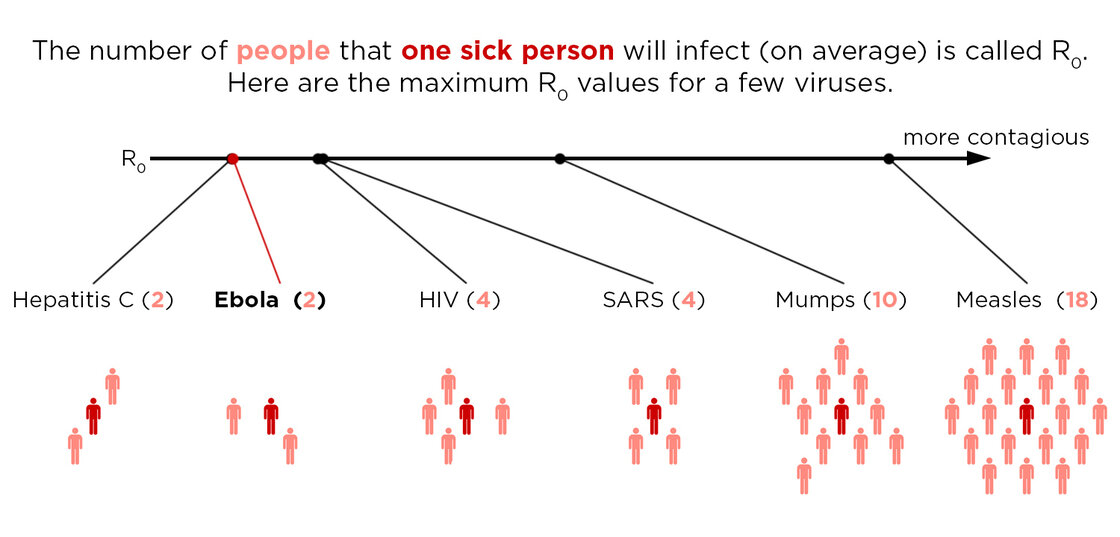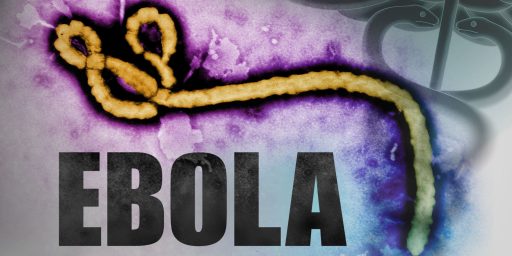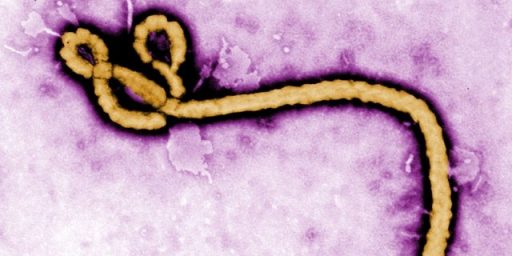Ebola Numbers
Via the BBC: Ebola outbreak: Six surprising numbers.
The ones that stood out to me were:
-
1 in 50 Liberian health workers infected
-
90 days without sex for survivors of Ebola (The Ebola virus can remain present in semen for a long time. Experts say it is best for men who are recovering from the disease to avoid sex altogether – or make sure they use a condom – for 90 days.).
-
1.7 people infected by each Ebola sufferer in Liberia.
The first and last struck me because they speak to the probabilities of spreading the disease (especially given the hysteria at times here in the US). The middle number was interesting only because I had never heard it before (and because it also speaks to possible transmission over a long period of time).
Looking for more information on the last number lead me to this NPR piece: No, Seriously, How Contagious Is Ebola?
The reproduction number, or “R nought,” is a mathematical term that tells you how contagious an infectious disease is. Specifically, it’s the number of people who catch the disease from one sick person, on average, in an outbreak.*
Take, for example, measles. The virus is one of the most contagious diseases known to man. It’s R0 sits around 18. That means each person with the measles spreads it to 18 people, on average, when nobody is vaccinated. (When everyone is vaccinated, the R0 drops to essentially zero for measles).
At the other end of the spectrum are viruses like HIV and hepatitis C. Their R0s tend to fall somewhere between 2 and 4. They’re still big problems, but they spread much more slowly than the measles.
And that brings us back to Ebola. Despite its nasty reputation, the virus’s R0 really isn’t that impressive. It typically sits around 1.5 to 2.0.
This is graphed out in the piece:

(The measles info also underscores the problems associated with the anti-vaccine movement).



About 20 million people contract measles per year. Of those about 120,000 die. That’s about one out of every 167. Of those who contract Ebola more than half die.
That’s the reason for the reaction to Ebola. If it were just a matter of how infectious a disease is, every time anyone came down with a cold a riot would break out.
@Dave Schuler: Yes, I do understand that. However, the point would be that if one watches the news one would often get the impression that the infection rate is practically 100% for all who come in contact.
I am not attempting to imply that Ebola as a disease is less dangerous than measles.
@Steven L. Taylor:
My point is two-fold. First, contagion rate is a red herring. The second is what’s the most effective defensive strategy? The most effective defensive strategy for many diseases is treating them. The most effective defensive strategy for Ebola is not contracting it in the first place.
I think there are reasonable disagreements about how to avoid contracting Ebola. I think, for example, that Australia’s and Canada’s travel bans are overreactions.
However, I think that those who think that any reaction to the West African epidemic is an overreaction are overreacting themselves. My own preferred reaction would be more energetic public health assistance measures in West Africa.
@Dave Schuler: I don’t disagree. However, I didn’t make any policy recommendations in the post nor did I comment on reactions or overreactions.
Mostly, as noted, I found the numbers interesting.
The 90 days of deadly semen makes me a little uneasy about claims of Nigeria being ebola free after 42 days.
Also, there is some infectious diarrhea in the previous ebola thread that someone should take care of, after donning protective gear.
Here’s the one that surprised me the most: 19,980 burial kits needed.
The bodies are still incredibly infectious after death, I would have expected that cremation would be required.
I mean, I’m not expecting wild animals to go digging up bodies in cemeteries or something, and I doubt the virus will survive long enough for someone to build a housing project on an ancient ebola burying ground, but it would cut the exposure risk for funeral workers. Just bury the ashes.
@Dave Schuler:
It was less than 50% mortality in Nigeria. In the US with prompt medical care the mortality is currently 0% (0/4). It is a very small r here, but assuming we will do worse than Nigeria is crazy.
In no way is ebola’s transmissibility a red herring. If it were highly transmissible then there would be cause for a lot of worry. As it stands now, you are more likely to be nearly anything else.
Except for NPR or public television, the regular electronic media did not bother much with having informed public heath and medical researchers weigh in on Ebola and the risks that faced us. Instead, televised media coverage was based on fear. Televised news coverage of the Ebola “crisis” was largely a disgrace.
As Bill Maher points out, here in America, more people were killed by OJ Simpson than have died from Ebola.
@Grewgills:
According to the WHO Situation Reports, the mortality rate for the West African Ebola epidemic has been just a bit over 50%. That has been challenged by some as an understatement. The fatality rate for previous Ebola outbreaks has been 70%.
Here’s an interesting and relatively detailed chronology of EBOLA outbreaks since the virus was first isolated:
http://www.cdc.gov/vhf/ebola/outbreaks/history/chronology.html
@Dave Schuler:
The death rate from the bubonic plague is pretty high, too, but since no one is catching it, there’s very little reason to worry. Smallpox or the Spanish flu could get loose and kill millions but again, if no one’s catching it the risk is theoretical.
Guns kill 30k every year, round numbers, and we are paralyzed as a society, unable to respond. Ebola so far has killed zero of the three or four who’ve contracted it in the US. No rational risk assessment would place ebola in the top 100 things to worry about. Your stairs will kill you before ebola does. Lightning will kill you before ebola does.
@Dave Schuler:
That is primarily because the outbreak was concentrated in Liberia, Sierra Leone, and Guinea where, to put it mildly, there are not fully functional central governments or public health apparatus. In Nigeria, the mortality rate was ~40%. In the US for people treated promptly it has been 0%. The figure I have seen put up for developed nations is ~25%. We have done better than that and hopefully will continue to. Couple that with VERY low transmissibility and you have a problem orders of magnitude smaller than the attention it is receiving.
@michael reynolds:
Right now, for the individual, that is true.
But, for the national government, ebola should be pretty high up there — we need to help contain the outbreak in west Africa, so it remains a trivial number of cases here (and our in allies around the world) and the rest of us can continue to be struck by lightning and/or killed by OJ Simpson at a higher rate than ebola.
Also, unlike a lot of our other foreign policy objectives, this one seems doable. Mid East peace? A stable Iraq? Whatever we hope to happen in Afghanistan? The Ukraine? All harder problems. Let’s solve the easy one and get a little credit.
@Gustopher:
I am all for helping Liberia and the rest deal with this. In fact, I’d love to see the US do more to support the UN and the NGO’s that are on the front line.
But the risk to the average American is essentially zero. Nor does it seem to have traveled to Europe which gets a whole lot more movement to and from the affected areas. It doesn’t even seem to have traveled to the Middle East, or India, or China. All of which suggests we should be helping the Africans out of simple human decency but not out of concern for ourselves.
@michael reynolds: I think you underestimate the risks, and while the outbreak continues to spread in west Africa, the risk increases.
Roughly, risk of an outbreak outside of west Africa is proportional to the number of people currently infected in west Africa (assuming a constant level of travel, etc). To get a full scale outbreak, we would need a failure in our tracking, a failure in our response and a person acting stupidly because they are convinced they cannot possibly be infected. We had two out of three in Dallas, and other countries have worse tracking and responses.
It’s not drop everything else and make it the number one priority levels of risk, but it is significant and will grow larger.
Ebola is pretty deadly to those who catch it. Thankfully it isn’t an easy virus to catch-airborne viruses are much more infectious than those transmitted through bodily fluids. I had already read about the semen being an issue but wonder how infectious the virus is that is present in the semen.
I don’t think there is any reason to panic in the US over Ebola.
However the way things have happened with the cases thebUS did have this leads me to question how effective we would be if there was a serious outbreak. Seems like more needs to be done with regards to training of healthcare workers to screen for and treat possible cases and there needs to be a better policy with how to react to future outbreaks and what circumstances would trigger certain responses.
Basically if I were to catch Ebola I would want to be treated in the US but I’m left unconvinced the CDC is ready if there is a major outbreak.
I would like to see more being done in Africa to prevent a major outbreak. It’s pretty clear that some countries were unable to handle the number of sick and they are reeling still from this outbreak.
Fun fact: More Americans have married Kim Kardashian than have died from Ebola.
@Gustopher: I do hope that we remain panicked enough about it to finish developing a vaccine for it. It boggles my mind that we had almost developed it 10 years ago and then put it on the shelf.